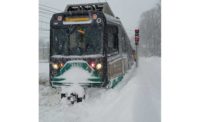MBTA Approves Signal Systems Upgrades

A $217.7 million contract to upgrade and modernize the signal systems on Red and Orange Lines was approved by the Massachusetts Bay Transportation Authority management board earlier this month.
The signal-replacement contract –the last major project awarded under the nearly $2 billion Red-Orange Line Infrastructure Improvement program—will install new signal systems on both lines. This is expected to substantially improve service reliability and improve peak-hour headways, the agency stated. Substantial completion is scheduled by April 2022.
The program also includes the replacement of the Orange/Red Lines fleets with more than 400 new vehicles, in addition to rebuilding and modernizing maintenance facilities
MBTA General Manager Luis Manuel Ramírez at the MBTA Fiscal and Management Control Board meeting on Oct. 1 said, “Replacing our signal systems with cutting edge technology will allow us to maximize the performance of our new fleet vehicles, increase capacity, and position us to respond to issues that may impact service faster and with more accurate information than we have today.”
The design-build project will upgrade signal technology to the next-generation Digital Audio Frequency Track Circuits, from analog technology, agency notes. The contract was awarded to Barletta Heavy Division using Alstom technology.
Michael Fitzgerald, senior project manager of capital delivery for the Red Line/Orange Line Improvements Program, said the upgraded signal technology is easily configurable improves diagnostics and allows for lower maintenance costs.
When paired with new fleet vehicles, the MBTA expects the new signal systems will allow Orange Line trains to run every four and a half minutes during peak travel hours. Red Line trains will run every three minutes between Alewife and JFK/UMass stations and every six minutes between Ashmont and JFK and Braintree and JFK.
Fitzgerald said, “The greatest challenge of the project is to introduce the new signal system while not disrupting the existing one. The work will be highly planned and executed in a tightly controlled environment using standard industry techniques.”
Aside from signal technology upgrades, crews will construct three central instrument houses on the Red Line, replace cables and install new switch machines from State to Forest Hills Stations. The project will also upgrade a series of switches at Andrew Station to a modern, remote controlled crossover.
“A fair number of delays manifest themselves as signal delays, but could be related to any problems with the signals, track, power, or signal-to-train communication,” says an MBTA spokeswoman. “The signal system identifies the problem and gives operations indications to operate in bypass mode or manual block mode.”
The system upgrades, in addition to providing more controls and technology more easily repaired, will be able to assist with the diagnosis of problems so repairs can be made more efficiently to reduce delays, she says.





